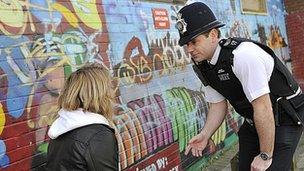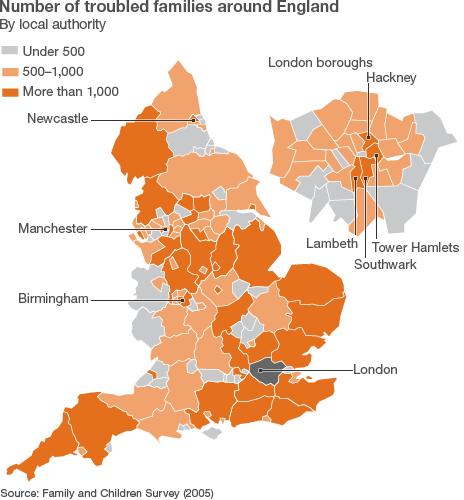Councils back troubled families scheme
- Published

Ministers say problem families are costing the state billions of pounds
Every eligible council in England is to take part in the government's programme to tackle the problems of "troubled families", ministers have said.
The news represents an expansion of a scheme under which local authorities get financial incentives to tackle some of the 120,000 families said to cost the taxpayer £9bn every year.
Ministers have said they want to turn around these families' lives by 2015.
Labour says government cuts limit the impact of family intervention schemes.
The government says the 120,000 families are to blame for a significant share of social problems because the adults are usually on benefits for life, their children are often absent from school and the police are regularly called to their homes.
The estimated £9bn they cost the public purse each year relates to spending on them with regards to the NHS, the police and social services.
Under the government programme, councils are being encouraged to join up the efforts of the various agencies involved with these families - from social workers to teachers, police officers and doctors.
Social work 'fluency'
The government is diverting £448m from existing departmental budgets over four years to help pay for a network of people who will identify families in need of help, make sure they get access to the right services and ensure that action is taken.
But the money will cover only 40% of costs, and councils who want to use it will have to agree to fund the other 60% themselves.
However, if a local authority manages to cut a family's level of truancy, anti-social behaviour, or benefit dependency, it will receive extra money.
Communities Secretary Eric Pickles said that 152 councils in England would be incentivised to send in troubleshooters to confront the difficult families in their area.
Speaking the BBC's Today programme, Mr Pickles announced that all councils had agreed to take part in the scheme and there was now a "window" of opportunity to deal with problem families.
He said: "I think there's a kind of acceptance that we tend to throw money at these folks for them to go away and we have a chance now, a window to actually break that cycle of deprivation. We've been piloting it. We've seen some very good turn arounds of these families and I think its an attempt to say we're not going to abandon these families."
"These families are ruining their own lives, they're ruining their children's lives and they're ruining the lives of their neighbours and I think it's a laudable attempt to deal with that to get their kids back into school, to get them on the road to work and to cut down anti-social behaviour", he added.
'Important work'
Under the government's measure, families need to meet five out of seven criteria - including truanting children, parents with addiction and anti-social behaviour - to be classified as "troubled".
Research by the Economic and Social Research Council (ESRC) has questioned the government's calculation of the number of families that meet this criteria.
An <link> <caption>ERSC report</caption> <url href="http://www.poverty.ac.uk/sites/default/files/trouble_ahead.pdf" platform="highweb"/> </link> says the Department of Communities and Local Government "misrepresents" the background research on which the figure of 120,000 "troubled families" is based.
"In the term 'troubled families' it deliberately conflates families experiencing multiple disadvantage and families that cause trouble. The attributed costings are obscure and certainly open to question," the report says.
Speaking at the launch of the initiative in March, Prime Minister David Cameron said some "deeply troubled families", who were "deeply chaotic", were responsible for "a huge amount of social problems, for themselves but also for the wider community".
"I am very proud of the fact that this government has decided to roll up its sleeves and really try and deal with these problems, it's a hugely important area of work," he said.
But, when this initiative was first proposed, Labour MP Gloria De Piero said there was only so much troubleshooters could do when cuts were hitting family intervention projects.

- Published15 December 2011
- Published14 September 2011
- Published15 August 2011